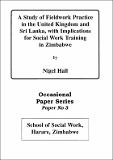| dc.contributor.author | Hall, Nigel | |
| dc.coverage.spatial | Zimbabwe. | en |
| dc.coverage.spatial | United Kingdom (UK) | en |
| dc.coverage.spatial | Sri Lanka | en |
| dc.date.accessioned | 2016-02-26T10:36:42Z | |
| dc.date.available | 2016-02-26T10:36:42Z | |
| dc.date.issued | 1995 | |
| dc.identifier.citation | Hall, N. (1985) A study of fieldwork practice in the United Kingdom and Sri Lanka, with implications for social work training in Zimbabwe, Occasional Paper Series Paper No.3, Harare: School of Social Work | en |
| dc.identifier.isbn | 0-7974-1467-3 | |
| dc.identifier.uri | https://opendocs.ids.ac.uk/opendocs/handle/20.500.12413/9574 | |
| dc.description | An occasional paper on social work practice in the UK and Sri lanka and their implication on social work training in Zimbabwe. | en |
| dc.description.abstract | Firstly social work is an international profession, with an international literature. Initiatives in one part of the world need to be considered by social workers in other parts, particularly where there are similarities in the socioeconomic situations of respective countries (eg poverty, communal values, etc).
Secondly the problems faced by social work educators are analogous and useful comparisons can be made between them. Exchange of information and dialogue with regard to achievements and failures in the field of training can be mutually beneficial.
Thirdly, a similar philosophy of adult education binds schools and faculties of social work in different continents together. This became obvious to me in researching the background approaches of various training institutions and bodies, where similar references and statements of intent were made in discussion of the mission and programmes of these organisations.
This Occasional Paper examines the use of practical fieldwork as a means of training student social workers to engage in professional practice. Aspects of the practice curriculum are discussed as well as the structure and general orientation of this method of training students. There are four main sections. Section One outlines fieldwork issues in the United Kingdom, particularly with regard to the accreditation of practice teachers and concerns over the quality and methodology of fieldwork training. Section Two examines the use of fieldwork in one Third World country (Sri Lanka) and its orientation towards social development. Section Three offers some comments and observations on theories of adult learning and their relevance to fieldwork training, while Section Four draws together some practice lessons which Schools of Social Work may wish to consider with regard to developing their fieldwork programmes. | en |
| dc.description.sponsorship | Financial support from the Konrad Adenauer Foundation (KAF.) | en |
| dc.language.iso | en | en |
| dc.publisher | School of Social Work (SSW) (UZ) | en |
| dc.relation.ispartofseries | Occasional Paper Series;3 | |
| dc.rights.uri | http://creativecommons.org/licenses/by-nc-nd/3.0/ | en |
| dc.subject | Education | en |
| dc.subject | Social Protection | en |
| dc.title | A study of fieldwork practice in the United Kingdom and Sri Lanka, with implications for social work training in Zimbabwe | en |
| dc.type | Series paper (non-IDS) | en |
| dc.rights.holder | School of Social Work (SSW), (UZ) | en |


